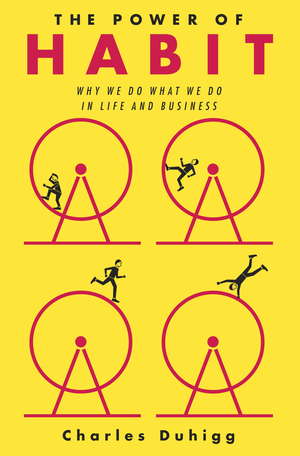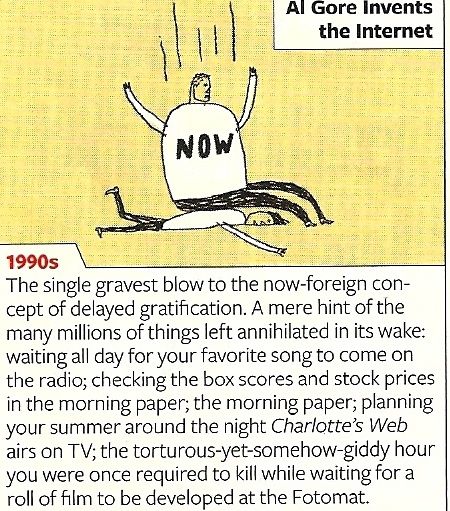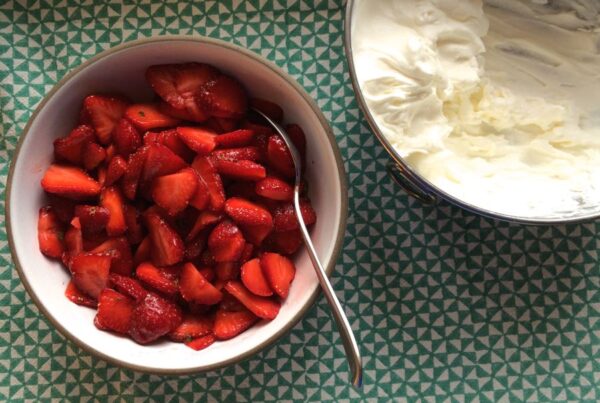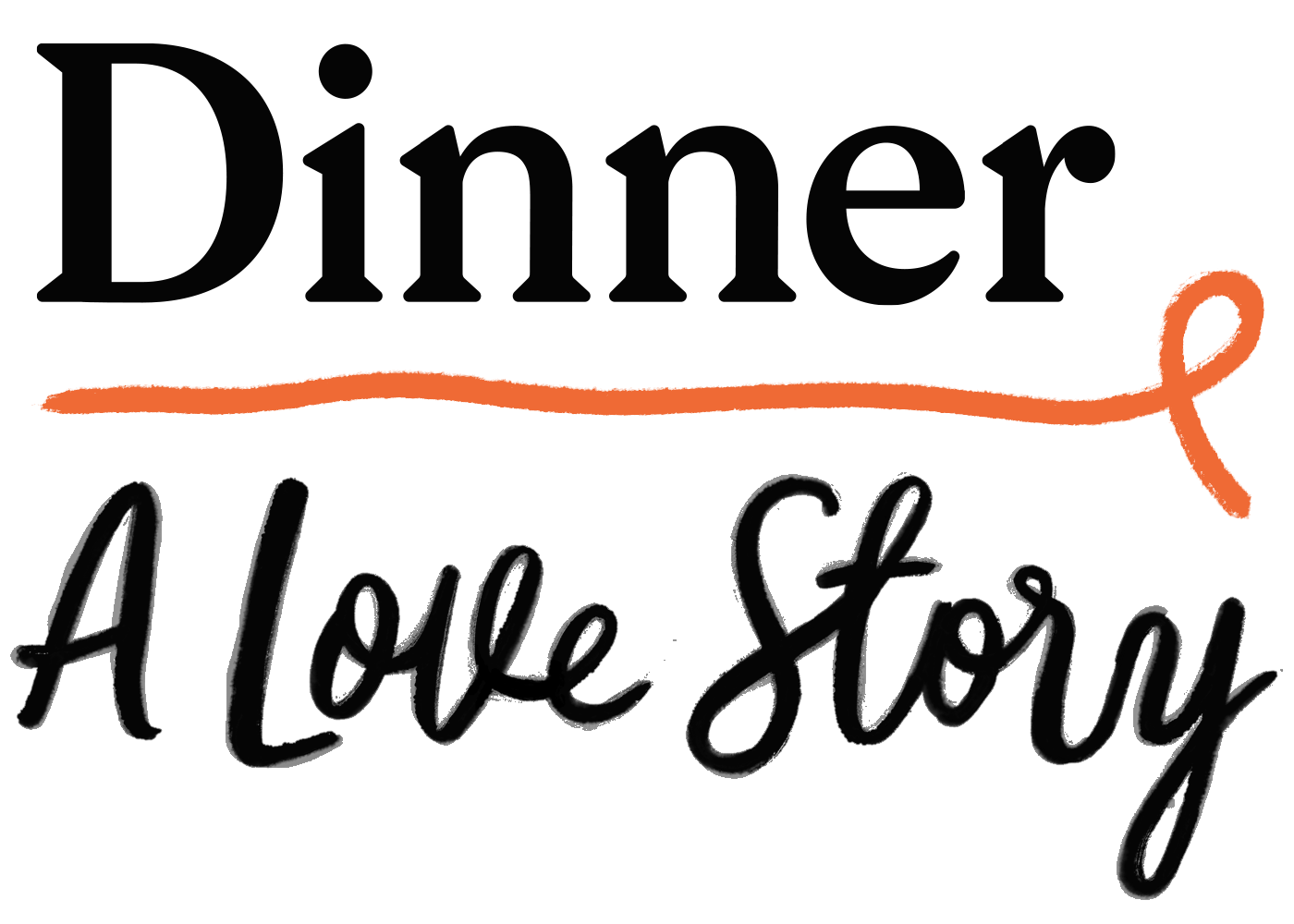You want to know what’s fun about being an editor? You get to live vicariously through people who are smarter, better traveled, and more interesting than you. Charles Duhigg is one of those people. Charles is an investigative reporter at The New York Times — if you haven’t been following his series on Apple, it’s really worth your time — as well as the author of a book I worked on, just published last week by Random House, called The Power of Habit. I know I’m not an objective source on this — I’m probably closer to a cheerleader — but the book was a total blast to work on and is full of ideas and stories and case studies that make you think about your life — including the way you eat, exercise, shop — in a different way. More than 40% of what we do in the course of any given day, it turns out, is not the product of rational decision-making; it’s habit. And that’s scary. Charles was kind enough to take a moment from his all-out media blitz to guest-post for us today about a particular DALS weakness, dessert. Tell us how to be better, Charles…
Let me be completely honest with you: I like dessert.
Not just a little bit. A lot. Basically, I would rather eat dessert than dinner. In fact, I have often had dessert for dinner. I’ve become accustomed — scarily so — to dessert every night. And it turns out I’m not alone.
This wasn’t a big problem before I had kids. Now, however, I have a 3-year-old (or, as he points out, a three-and-three-quarters-year-old). And guess what? He loves dessert, too! And not just a little bit. A lot. What a coincidence! We once went to Costa Rica so that he could see some monkeys and a white sand beach, and all he remembers is the chocolate I let him have after dinner each night. I am not kidding: if you ask him about Costa Rica today, he will tell you it’s a place where you can eat chocolate every night.
That isn’t good.
So, a few years ago when I started researching the science of habits for my book, one of my goals was to figure out how get a handle on my dessert habit (and my son’s). Not to go all Official Book Summary on you here, but in the last decade, our understanding of the neurology of habit formation has been transformed. In particular, we’ve learned that every habit has three components: a cue, which is like a trigger for an automatic behavior; a routine, which is the behavior itself; and a reward. Scientists refer to this as the “habit loop.”
When we’re talking about dessert, the habit is pretty obvious: There’s a cue (“dinner is over!”) a routine (“ice cream time!”) and a reward (“oh my god, this chocolate chip crunch tastes good, oh my oh my god”). What neurologists have learned is that habits are powered by cravings. In fact, if we could stick electrodes in my brain (which I wouldn’t recommend – very messy), we would see that as soon as dinner is over, my brain starts anticipating – which is another way of saying craving – that chocolate chip crunch. And if the ice cream doesn’t arrive? My brain gets unhappy, and starts giving off patterns that look a lot like anger — or even depression.
Which brings me to my son. Once dessert became a habit for him, it was nearly impossible to stop. He would throw a fit if dessert wasn’t delivered. He would scream and cry and throw himself on the floor. One night, after I denied him a cookie, my son told me — before storming off — that I was no longer fit to be his father. Superman, he announced, would be taking my place. I would be a bystander who happens to share his home. Which, to be honest, kind of hurt. (Would Superman spring for a Costa Rican vacation, kid? Doubtful. That guy is notorious for using the “there’s no pockets in this leotard” excuse to skip out on the bill.)
My wife and I knew we had to change my son’s dessert habit. But how? When I asked the psychologists I was interviewing for my book, they told me that you can’t destroy or eradicate habits – you can only change them. The key, they said, was inserting a new routine – a new behavior – into my son’s after-dinner habit loop.
So we got to work. We realized that whenever our son talked about dinner, he always mentioned dessert. He had become habitualized to associate mealtime with sweets. We went to work on that cue. Now, when we talk about dinner with our son, we emphasize all the other important aspects: the togetherness, the chance to talk about our days, the fact (well, as far as he knows) that Superman got strong because he ate lots of vegetables.
And, most important, we found new rewards. If our son eats his dinner, he gets to read a story with me before bed. Every time he takes three bites of broccoli, we tell him a joke. (The knock knock banana one kills EVERY SINGLE TIME.) It’s not that we never let the poor kid have dessert — we just vary it, and keep him guessing. Sometimes it’s fruit. Sometimes it’s one marshmallow. Sometimes it arrives after his bath, and sometimes it shows up in his snack, before dinner. Habits emerge when patterns are predictable – when our brains learn to crave a specific reward at a specific moment.
It has worked, too, and not just for desserts. If you play with cues and rewards, you can change almost any habits. Studies have shown that when people disable the buzzing on their smart phones, for instance, they stop checking their emails at the dinner table because the cue has been disrupted (and so the craving for the reward of distraction that email provides never materializes). Smokers who start drinking a double-espresso with their morning paper (rather than smoking a cigarette) are more likely to quit. Why? Because the caffeine provides a buzz that is similar to nicotine. The reward is still delivered – but the behavior has changed.
Speaking selfishly here, the best news is that I no longer gorge on dessert every night. I model better eating habits. I’m not saying I deserve a trophy or anything. But, on the other hand, have you ever seen Superman pass by the donut box without snagging a jelly filled piece of fried dough? I didn’t think so. Take that, so-called “Man of Steel.” — Charles Duhigg
P.S. GIVEAWAY!!! Comment below with a story about how you broke a habit (your own or your kid’s) and be eligible to win a free autographed copy of the book.
UPDATE: A.E. Hoseth (#73) and Ali (#82) are the winners. Thanks for playing!
Illustrations and cover design by Anton Ioukhnovets.







We broke the dessert rule in a similar fashion- totally mixing it up. Some nights fruit, some nights sweets. Its a slippery slope though- we doled out frozen chocolate chips for a few nights and the kids went wild and demand them on a nightly basis now. Back to the only-fruit-for-dessert routine…
The best way to get rid of a bad habit is to replace it with a good one. I find associating songs with actions helps a lot, I don’t have to tell my daughter to do something (and risk an emphatic NO!). I simply start singing the “clean up” song or the “going to bed” song and she knows what’s coming. Another key point is to do myself what I want her to do, toddlers can’t resist imitation!
I quit sucking my thumb when I knew the braces were coming off – please don’t tell my parents even though it was 25+ years ago. I knew I had to stop and probably was emotionally ready to stop – it was cold turkey. My dessert habit – I’m not emotionally ready to stop yet.
Great post – I had an afternoon coffee break habit, first by scheduling meetings at that time but also allowing Friday only coffees.
A habit I’m still working on is checking my email all the time while I’m doing work on the computer. I’ve been not opening my browser when I’m just working on spreadsheets of word documents and it seems to have helped.
What a great topic! And just as I was sitting here, thinking of ways to improve our 7 year old’s homework habit! I broke the habit of grazing from the time I walk in the door after work, until dinner time, by making a cup of Melita-brewed coffee. It slows me down and gets me focused on that, rather than on munching. Of course, don’t get me started on my coffee habit!
My husband and I broke our habit of eating out almost every night by thinking about dinner at lunchtime. Otherwise we were too worn out, and it seemed easier to just go pick something up. It really doesn’t take any more time to make a yummy pasta dish than to go wait for something to be made, and it tastes much better!
This is fascinating… this could help me with some of my bad habits. One habit I’ve gained (that can be as important as breaking, right?) is getting up early to excercise: it was hard, at first, when it was dark, but soon enough the good feeling of being awake and ready to start the day– and having free time in the evening to *not* excercise– made it worth it, and after a few weeks, it became the good habit. It’s hard, though, when that routine gets broken again– perhaps Mr. Duhigg’s book elucidates that!
My husband and I started the dirty habit of eating something like dessert after our kids got into bed. It was our “treat” for getting through the day with two small children close in age. Now they are older and we STILL can’t wait till they get to bed, we have wide eyes just waiting for the time our boys’ heads are laying on their pillows. As we leave their room my husband poses the question, ” what is it? What is the treat tonight?” Six years later we are still doing it! We can’t break the “their in bed” habit!
I recently had my second child (362 days after my first child). After we brought baby #2 home, baby #1 “needed” her binky during the day. Prior to, her binky and blanket stayed in her crib. Each morning when we would bring her downstairs, she would ask for her binky by saying “b-b”. It was easier to give the binky to her, especially when baby #2 was drinking her bottle, than to listen to her cry. After a month of baby # 1 constantly having a binky in her mouth, we decided that it was enough. When she would ask for her b-b, we would respond, “Your binky is upstairs in your crib. Do you want to go upstairs?” She would give us a sad/dirty look and reluctantly go play with her toys. She would try a few more times during the day, and we would respond the same way each time. Eventually, the requests became less frequent and finally after a week she stopped asking us 🙂
I would love to win this! I heard his interview on NPR and was so interested I drove around the block a few times so I was able to listen to the whole thing!
The habit I am proud of breaking is staying up late. I was a total night owl before my son was born. I would read, watch tv, catch up on emails, occasionally move furniture (seriously) but would be so tired the next day. That kind of tired plus life with an exuberant toddler, is punishing. Now I go to bed when my early bird husband does. I sometimes miss my late night alone time, but my body and mind are certainly better off!
I would love a copy of this! Some years ago I broke the bad habit of staying up too late by simply turning off the tv at 10pm. I realized that if I watched the 10pm show, I would then be tempted into watching the news, from which it was an appallingly simple step to David Letterman and doom the next morning. Alas, since then I have married a man who loves the 10pm show (*any* 10pm drama, it seems) and the late nights have crept back in.
I recently semi-broke the habit I had fallen into of getting take-out every night instead of cooking at home. I muscled through the cravings and it’s still a struggle to be strong (so clearly I have not addressed the cues and rewards!) and I can’t wait to read this book to help me figure it out once and for all (whether I win it or not).
I broke the habit of turning on the tv every night after I got my daughter in bed and then staying up too late. It was so hard to get up and make myself go to bed. I broke the habit by putting the tv in a place where it was harder to get to and more uncomfortable to watch. I could still watch the things that really mattered to me (like Obama’s inauguration and the Olympics), but it was too much trouble for your average evening show. Now I see that it was partly successful because it broke my routine.
I recently broke my habit of not planning what to cook for dinner. Now on Saturday or Sunday I figure out which recipes I’m going to make and all the ingredients I need. Now I (usually) only of grocery shopping once a week and dinnertime is not a mad scramble. Can’t wait to read this book.
About 6 months ago, I gave up sweets. I broke this habit by eating a lot more protein, especially in the morning when I crave a donut, or muffin the worst! Now I eat eggs followed by a chocolatey protein shake made with almond milk. It satisfies my sweet tooth and gives me the extra sustaining energy I need to make it to lunch.
I broke a bad bad habit of eating a bag of peanut butter M&M’s every night by making a deal with myself: I could eat it if I ate broccolis before, which i hate, but apparently is good for you. I thought of a way to balance things (anything is ok as long as you have broccoli right?) and also avoid eating M&M (i really really don’t like the little trees). anyway, i still eat them, but like once every ten days? good enough. hahaha
I am so excited to read this book. I broke the habit of eating at night by replacing my evening grazing with some mint tea. It’s satisfying and allows me to enjoy the food I eat in a more thoughtful manner, rather than boredom snacking.
Unbelievable. My son was just whining about dessert after dinner as I started to read this post. I made a weekend only dessert rule in our house but I don’t think it’s the answer to my problem! You gave me lots to think about ….
So fascinating! I am a teacher, and after picking up my son from his school, I’m starving and in need of a “break” and a reward. We both take some down time at home, and that’s usually when I eat sweets. Sometimes it even snowballs in to constant snacking from 3:30 – dinner! (yikes!) I’d love to change this habit. In the past I gave up sweets all together when training for a competition. I did give up my Facebook habit – by giving it up for lent. Hmmmm . . . maybe a walk after school, and a big glass of water would help??
Wow. This resonates with me like a GONG! I can’t wait to read this book!
I have conquered and replaced a couple of big habits during the last five years. I had a Diet Pepsi habit that had me consuming +2 litres a day, every day, at all hours. When I decided to focus and fix it, I left an emergency can of DP in the crisper and filled my fridge with bottled water. Over and over again I automatically went to the fridge and had to choose water instead. After a weekend of this, I thought I had the problem licked…then I went to work and had to face the vending machine and all of my work related habits. But I did it.
Food was my other big habit. I lived on a diet of “beige” food (fried foods, carbohydrate delights, next to no vegs) for years. Two years ago I sought out the right plan for me and replaced my old habits.
It’s important to know what cues us and to know when we’re at risk of returning to our default setting. It’s easier for me to make good choices when I’m not “starving” or over-tired, and I have little rules to help me cope in “risky” situations where I’m likely to default, i.e. social functions, movie theatres, etc.
I think the easiest way to kick a habit it to change the routine. It’s a little bit of a cheat, but it worked! I started a new job – which fortunately does not have a candy bowl at the front desk, or free bottomless coffee all day. And, guess what? I no longer munch on candy during the day when I’m hungry (bored) and I limit myself to the morning coffee at home only. Hooray!
Count me as another with a dessert habit – I need something sweet after a meal and it’s so annoying! I try to make it a healthy sweet, or at least low-cal, like fruit, chocolate covered almonds, or plain whipped cream, but still……
Other than this I’m pretty healthy, I eat well and exercise 5 days a week. But I want to kick the sweet tooth habit! The book sounds really interesting, I’m going to pick it up and check it out.
We used to have a great morning gym routine, and, like some other posters, a move disrupted that routine. Time at the gym became time clearing the yard, demo-ing bookcases, etc. Now that the house (and even the yard, surprisingly) are under control, it is time to get back into the exercise habit again. This book seems like it has the tools to help instigate!
I heard Michael Pollan say in an interview that if you only make the foods we consider to be indulgences yourself, you will probably be less likely to consume them. This resonated with me! So, I adopted the rule that we only have homemade desserts. It has been effective. I’m a working mom, and this is one situation where I actually feel good about the fact that I don’t have enough time to do it all. Treats really are a treat, and the dessert habit has been broken.